Switzerland, often described as “the most enchanting place on Earth,” graces us with its presence. This nation, cradled amidst the awe-inspiring Alps, is lauded for its genteel society and renowned for its contributions to the world of cheese, chocolate, and precision timekeeping through clocks and watches. If you’re an aficionado of history, medieval architecture, and the quintessential European ambiance, Basel beckons as your ultimate destination. This city, nestled in the northern reaches of Switzerland, is not just an intellectual powerhouse but also a hub for the chemical and pharmaceutical industries. It’s no wonder that Basel proudly bears the title of the “cultural heart of Switzerland,” boasting an impressive collection of 40 museums. It is, unequivocally, a hidden gem waiting to be discovered within the rich tapestry of Europe.
A Glimpse into Basel’s Jewish History
Centuries past reveal a somber truth: Jews were prohibited from residing within the city walls of Basel. Regrettably, like in many other places, they were often seen as outsiders. In some of history’s darkest moments, such as those in Basel and Strasbourg, the entire Jewish populace was confronted with a chilling ultimatum: either embrace Christianity or endure the horrific fate of being burned alive. For instance, the accusation that Jews were responsible for the Black Plague in 1349 led to the harrowing immolation of 600 Jews and the coerced baptism of the 140 surviving children. The emergence of a fledgling Jewish community began to take root in the latter part of the 14th century. Despite a 400-year prohibition on the establishment of a Jewish community within Basel, Jewish life continued to thrive in the broader region, particularly in Alsace.
While contemporary Switzerland stands as a testament to peaceful coexistence between Jews and Christians, it’s essential to recall that from the Middle Ages until the 19th century, Basel, like many other European cities, was a crucible of discrimination, persecution, and pogroms against its Jewish residents. Today, a vibrant tapestry of Jewish communities, ranging from orthodox to liberal, flourish in Basel, encompassing approximately 2,000 individuals who call Basel and its surroundings their home.
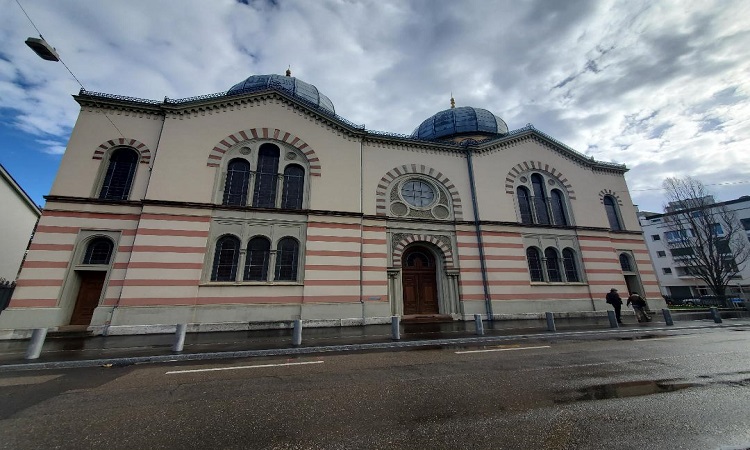
Synagogue Beit Yosef-New York Jewish Travel Guide
Basel’s Synagogue and Thriving Community
In 1868, the Israelitische Gemeinde (IGB) synagogue, a true architectural masterpiece, was conceived by the visionary architect Herman Gauss. It skillfully intertwines elements from Byzantine, Moorish, and Romanesque styles, creating a stunning testament to both artistry and history.
This splendid edifice stands as a testament to a history steeped in richness and significance.
The IGB traces its roots back over two centuries, and today, it proudly stands as one of Switzerland’s most prominent Jewish communities, boasting approximately 860 members. Serving as both a cultural and religious sanctuary for its devoted members, the IGB nurtures the minds of its young ones with a nursery and kindergarten, catering to about 20 eager students. Remarkably, the IGB welcomes Jewish individuals from diverse religious backgrounds, fostering a rich tapestry of faith within its embrace. The synagogue adheres to the tenets of Halacha, or Jewish law, as it conducts its daily services under the guidance of a dedicated full-time chazan. Additionally, the IGB’s choir lends its melodious voices to the services on Shabbat and other special occasions, adding an enchanting dimension to the spiritual life of the community.
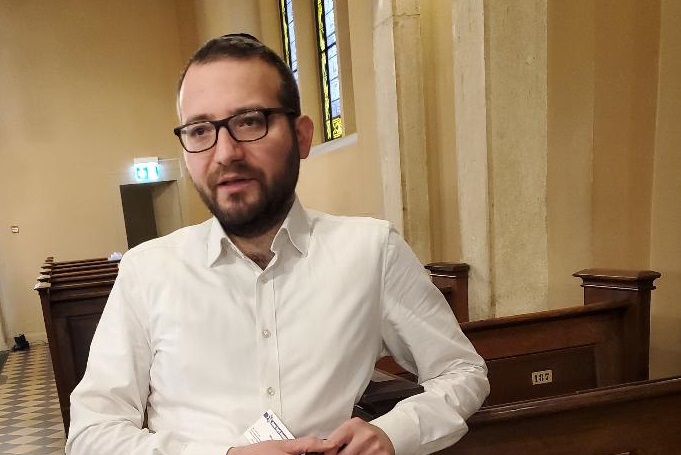
The synagogue’s gabbai, Jakov Pertsovski-New York Jewish Travel Guide
In a touching tribute to the memory of the late Joseph Y. Safra Z’L, the synagogue has been renamed “Beit Yosef Synagogue.” This meaningful announcement was made by Jakov Pertsovski, the synagogue’s gabbai, who originally hails from Germany and was raised in Munich.
Basel has warmly embraced 60 families who were graciously invited to the synagogue for the Passover seder and have been actively participating in various community activities, all made possible with the generous support of the synagogue.
Among the synagogue’s most remarkable features is the Karger library, a repository of over 4,000 works spanning the 16th to the 19th centuries, alongside invaluable rabbinic literature from historic Jewish centers like Vilnius, Lviv, and Prague. This library stands as a resilient testament, being one of the last survivors in the German-speaking world untouched by the horrors of the Holocaust. Additionally, synagogue members have access to a comprehensive list of kosher products for their convenience. For those in search of delectable kosher cuisine, the Numnum Dellicious (), a take-out kosher restaurant, can be found within the community center.
A heartwarming initiative undertaken by the nonprofit organization known as “The Jewish Women’s Association” involves coordinating kosher meals for elderly and ill individuals, thoughtfully delivered to their own homes. It’s noteworthy that most hospitals in the area offer patients the option of kosher meals during their stay.
Exploring Basel: Must-Visit Sights
Kunstmuseum Basel
Among the most renowned and historic public museum collections globally is the Kunstmuseum Basel. Spanning three locations, this museum offers a captivating journey through the annals of art history, commencing in the fifteenth century and extending to contemporary works. Within its impressive collection, you’ll find several paintings of particular significance to Jewish heritage. Notable examples include “King Solomon and the Queen of Sheba” by Konrad Witz, “Esther Before King Ahasuerus,” and “The Synagogue” by Jacob Epstein.
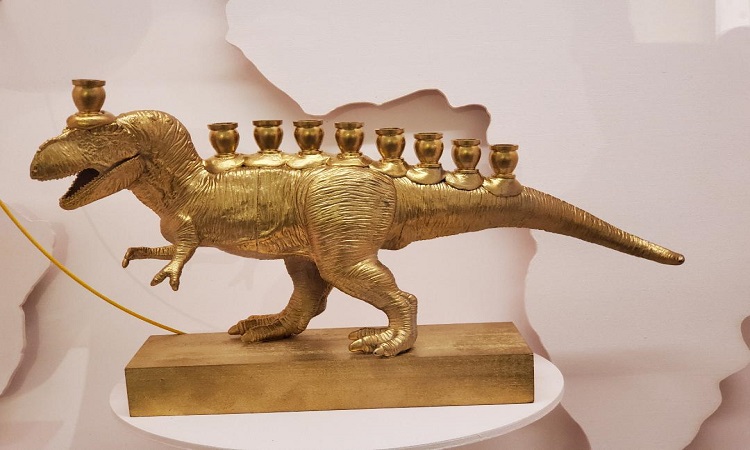
A Dinosaur Hanukah: The Jewish Museum-New York Jewish Travel Guide
The Jewish Museum
Switzerland boasts just one Jewish Museum that truly merits a visit: the Jewish Museum. Within its collection, this museum preserves a rich tapestry of Hebrew-language books, gravestones, historical documents chronicling the Jewish experience, and artifacts from the seminal First Zionist Congress. It serves as a poignant tribute to the area’s Jewish heritage. Among the treasures on display are small tefillin, a rare Book of Esther, Havdalah candles, a Polish Jewish chanukiah, and an array of other remarkable and exceedingly rare items. Additionally, you’ll find the original letters of Theodor Herzl and other artifacts from the landmark 1897 First Zionist Congress, an event convened by Herzl that laid the groundwork for the institutions that would ultimately shape the foundation of the future state of Israel.
Basel Street Art
Dating back to its inception in 1970, Art Basel stands as the preeminent global platform connecting collectors, galleries, and artists. As you amble through the streets of Basel, be sure to cast your gaze to the right, the left, and sometimes even skyward, for you shall be rewarded with the discovery of captivating street art and graffiti adorning the city center. Both national and international artists continually breathe life into the urban canvas on the city’s fringes. To unearth these hidden artistic gems, consider embarking on an urban art tour, which will allow you to uncover the city’s vibrant street art scene.
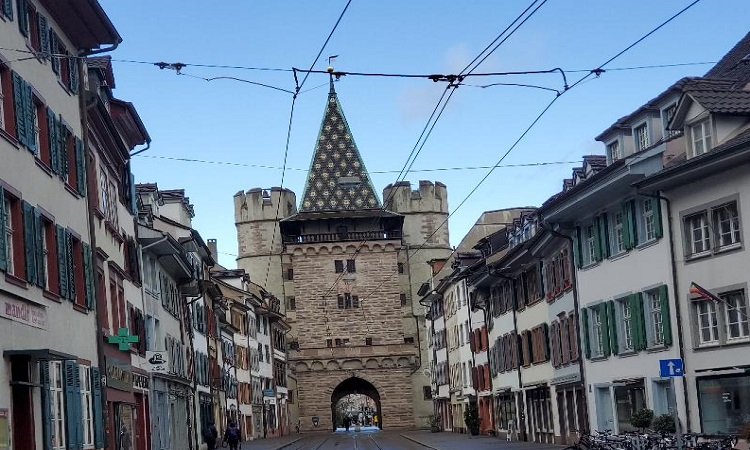
Spalentor is the gate to the Old Town of Basel—New York Jewish Travel Guide.
Basel boasts one of Europe’s most exquisite city gates.
Among the city’s cherished landmarks, the Spalentor, also known as the Gate of Spalen, stands as an icon. This gate is one of the triumphant survivors from a bygone era, harkening back to the days when it was an integral component of the fortifications encircling the ancient town. Remarkably, it was constructed in the aftermath of the 1356 earthquake, adding an extra layer of historical significance to its already storied existence.
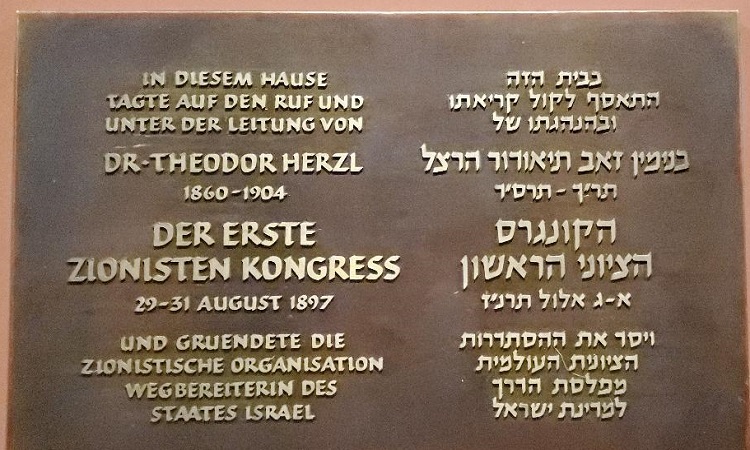
Memorial plaque to Theodor Herzl in Hebrew and Germanat the Basel Stadt Casino- New York Jewish Travel Guide
Experience a warm welcome at the Grand Hotel Les Trois Rois (The Three Kings).
Les Trois Rois stands as a deluxe five-star haven, the epitome of elegance in Basel, with an exquisite view overlooking the majestic Rhine. This venerable establishment has graciously opened its doors to guests since the 17th century, and it holds a special place in history as the lodging choice of Theodor Herzl, the visionary behind modern political Zionism, during the First Zionist Congress. Remarkably, you can still reserve and stay in the very room where Herzl once rested. This room has been lovingly preserved, retaining its essence from the time when Herzl was its occupant. Additionally, the music hall of the Basel Stadt Casino houses a plaque bearing inscriptions in Hebrew and German, commemorating the Congress. This plaque was dedicated in 1960, coinciding with what would have been Herzl’s centennial birthday.
Exploring the Wonders of the Old Town
Basel is a city where history comes alive, with a charming blend of architectural gems from various eras. A leisurely stroll through the well-preserved Old Town, dating back to the 15th century, is a fascinating journey. Wander along the cobblestone lanes, passing by nearly 300 water fountains, quaint shops, and picturesque buildings. Your exploration can commence in the picturesque Marktplatz courtyard and lead you to the iconic red City Hall, offering splendid vistas of the Rhine River as you traverse its vicinity.
Kosher Dining in Basel:
numnum dEllicious (Website: https://www.numnum.ch/)
Address: Leimenstrasse 24
Contact: Elli Benaiah, Email: elli.benaiah@gmail.com, Tel: 078 609 21 05
To plan a trip to Switzerland, contact Switzerland Tourism or go to https://www.myswitzerland.com/en-us/.
Fly Swiss: https://www.swiss.com/us/en/homepage.
To make a hotel reservation, email info@steinenschanze.ch or go to https://www.steinenschanze.ch/.
Visit the Swiss Travel System at https://www.mystsnet.com/en/.
Story by Meyer Harroch, New York Jewish Travel Guide, and New York Jewish Guide.
The author took part in a press trip sponsored by Switzerland Tourism.




You must be logged in to post a comment Login